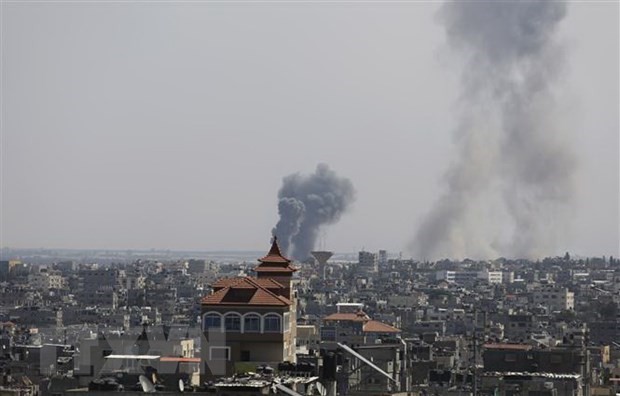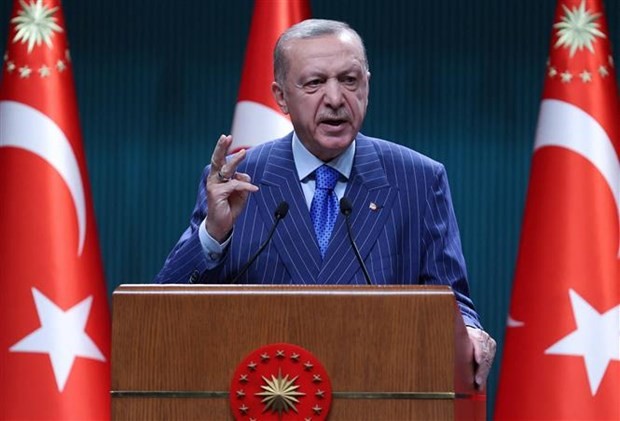(VOVWORLD) - The international community is racing to find solutions to ease tensions in Gaza, fearing that the conflict will spread beyond the Middle East and push millions of civilians into a humanitarian crisis.
 Smoke is seen after Israel's airstrike on Gaza on October 7, 2023. (photo: Xinhua/VNA) Smoke is seen after Israel's airstrike on Gaza on October 7, 2023. (photo: Xinhua/VNA) |
Armed conflict broke out in the Gaza Strip after Hamas forces suddenly attacked Israel last Saturday, leading to the Israeli army launching its largest retaliatory operation in several decades. As of Tuesday (October 10), more than 1,500 people had been killed and tens of thousands on both sides injured. Escalating fighting is likely to push the whole region into a new spiral of violence.
Contrary reactions
On Monday, the Israeli army announced the mobilization of up to 300,000 reserve forces to counter Hamas attacks and imposed a total blockade on the Gaza Strip. Israeli Prime Minister Benjamin Netanyahu said the Israeli army's current operation will forever change the order in the Middle East.
Israel’s drastic response has stirred contrary reactions in the international community. Many Western governments have voiced support for Israel. The US, the UK, France, Germany, and Italy issued a joint statement on Tuesday affirming their support for Israel, condemning Hamas, and warning third parties not to take advantage of the unstable situation to seek security benefits in the Middle East. Marches supporting Israel have been held in recent days in several other Western countries.
While condemning Hamas’s violent acts, the leaders of many countries and international organizations say that the international community should not have a one-sided view on the current conflict in the Gaza Strip. Secretary General of the Arab League, Ahmed Aboul Gheit criticized the attitude of some Western countries and said the highest priority now is to cool down tensions and achieve an immediate ceasefire, rather than racing to support one side or the other.
“Western countries have focused only on the conflict and avoided mentioning the causes behind the current situation in Palestine. It is necessary to return to a genuine peace process so that two states can coexist in peace, security, and stability."
In a statement calling on all parties to practice restraint, UN Secretary General Antonio Guterres said although Israel's security concerns are legitimate, this most recent violence does not come in a vacuum. The reality is that it grew out of a long-standing conflict over decades.
Efforts to resume talks
Worrying that the conflict will escalate dramatically in the coming days as Israel steps up its offensive in the Gaza Strip and Hamas threatens to execute Israeli hostages, the international community is racing to set up dialogues with both sides.
Egyptian President Abdel Fattah El-Sisi had a phone call on Monday with Prime Minister and Crown Prince of Saudi Arabia Mohammed Bin Salman and President of the United Arab Emirates (UAE) Sheikh Mohamed bin Zayed Al Nahyan to discuss ways to reduce tensions in the Gaza Strip. Egypt, Saudi Arabia, and the UAE play important roles in the Arab world and have substantive dialogue channels with the Israeli government. The UAE normalized diplomatic relations with Israel last year. Saudi Arabia is discussing relation normalization with Israel with US mediation. Iran is calling on the Organization of Islamic Cooperation (OIC) to hold an emergency meeting.
 Turkish President Recep Tayip Erdogan (photo: AFP/VNA) Turkish President Recep Tayip Erdogan (photo: AFP/VNA) |
Leaders of China and Venezuela have called on all sides to cease fire. Turkish President Recep Tayip Erdogan said Turkey is ready to mediate all sides, possibly starting with a prisoner swap. UN Secretary General Antonio Guterres said that all parties need to avoid actions that could make the situation in the Middle East irreversible.
"Even in these worst of times, and perhaps especially in the most trying moments, it is vital to look to the long-term horizon and avoid irreversible action that would embolden extremists and doom any prospects for lasting peace," said Guterres.
Concerns about a humanitarian crisis in the Gaza Strip are growing. Statistics from the UN Relief and Works Agency for Palestinian Refugees in the Near East (UNRWA) show that, as of Tuesday, about 187,000 Palestinians in the Gaza Strip had fled their homes. Some countries, such as Mexico, Chile, and Indonesia, plan to evacuate their citizens from Gaza and some localities in Israel.
Observers say that without urgent dialogues, the humanitarian situation in Gaza will continue to worsen in the coming days as fighting escalates, and the Gaza Strip will continue to be cut off from electricity, water, and food supplies.